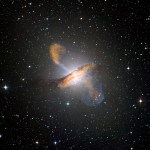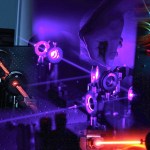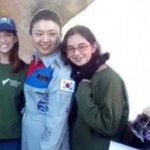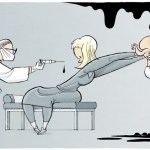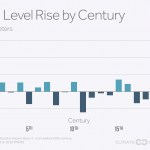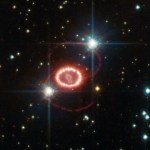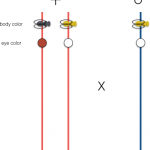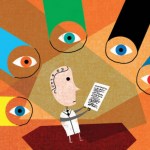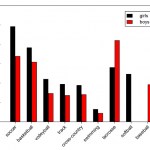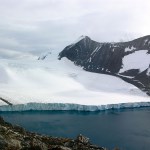Physical Sciences
Noted grouchy person John Horgan has found a new way to get people mad at him on the Internet, via a speech-turned-blog-post taking organized Skeptic groups to task for mostly going after "soft targets". This has generated lots of angry blog posts in response, and a far greater number of people sighing heavily and saying "There Horgan goes again..."
If you want to read only one counter to Horgan's piece to get caught up, you could do a lot worse than reading Daniel Loxton's calm and measured response. Loxton correctly notes that Horgan's comments are nothing especially unique, just a variant…
“If I can't make it through one door, I'll go through another door - or I'll make a door. Something terrific will come no matter how dark the present.” -Rabindranath Tagore
Time continues marching on here at Starts With A Bang, just as it does everywhere. My Patreon supporters have stepped up their game, and we're just $21 shy of unlocking our next goal! There are two great new items this week I'd love to share with you: first, our newest Podcast on dark energy and the fate of the Universe,
and second, a video whose script I helped write (with a bonus coming up) for…
Disentangling greenhouse warming and aerosol cooling to reveal Earth’s climate sensitivity (T. Storelvmo, T. Leirvik, U. Lohmann, P. C. B. Phillips & M. Wild; Nature Geoscience 9, 286–289 (2016) doi:10.1038/ngeo2670) doesn't seem to have garnered much attention. I glanced at it, I think, thought "that told me what I thought I knew already", and thought no more. Life is so much simpler when you need think no more. But then a correspondent who wishes to remain anonymous (and before you start guessing, no, it isn't JA, he is quite forthright) offered me some thoughts, and I thought I'd share…
It's no secret that I'm not particularly fond of the National Center for Complementary and Integrative Health (NCCIH). Formerly known as the National Center for Complementary and Alternative Medicine (NCCAM) and before that the Office of Alternative Medicine, NCCIH has been the foremost government agency funding research into quackery and the "integration" of quackery into medicine for the last 24 years, which is, of course, the reason I've been been harshly critical of NCCIH since very early in the history of Respectful Insolence. Basically, NCCIH not only funds studies of dubious "…
When I got interested in evolution, one of the first books I read was The Blind Watchmaker, by Richard Dawkins. I had never heard of Dawkins before reading that book. I read it simply because I happened to notice it a the public library and thought it had a cool cover.
The book's third chapter is called, “Accumulating Small Change.” In it, Dawkins explains how the prolonged action of natural selection can craft complex structures. He introduces his famous, “Methinks it is like a weasel” experiment. More precisely, he does two experiments. In the first, random strings of characters are…
“In fact, the mere act of opening the box will determine the state of the cat, although in this case there were three determinate states the cat could be in: these being Alive, Dead, and Bloody Furious.” -Terry Pratchett
Quantum mechanics has been described as the spookiest of all the sciences, since it’s by far the most divorced from our intuitive reality and everyday experiences. Even though we’ve been studying it for 100 years, there are still mysteries lurking in quantum phenomena still being uncovered.
Image credit: the LEP collaboration and various sub-collaborations, 2005,…
Is this science writer jazzed that ninth-grade girls from a religious girls’ school in Jerusalem won a space/science contest? You bet your sweet solar-powered spacelab she is! It is not just that these girls beat out a lot of other classes (over 400), or that they break more than one stereotype. They also came up with a pretty clever idea for studying the Sun: Send a spacecraft to scatter assorted nanolabs all over an asteroid that is about to pass close to the Earth on its way to the Sun. The contest is held every year in memory of Israeli astronaut Ilan Ramon, who went down with the crew of…
Well, I'm here.
Yes, last night I arrived in Boston for the Society of Surgical Oncology meeting down at the convention center. For any skeptics who might be so inclined the Boston Skeptics are planning a meetup on Saturday, details firming up. No talk this time, but at least we can hang out for a while. There probably won't be too much drinking on my part, either, because I'll be flying home Sunday morning, and flying with a hangover is not a good thing. How do I know this? Don't ask. I am, however, happy not to be in Detroit tonight, given that the Republican debate will be occurring mere…
As you probably already know, last year we ran a workshop at the Joint Quantum Institute for science-fiction writers who would like to learn more about quantum physics. The workshop was a lot of fun from the speaker/oragnizer side, and very well received by last year's writers, so we're doing it again:
The Schrödinger Sessions is a three-day workshop for science fiction writers offering a “crash course” in modern physics, to be held at the Joint Quantum Institute (JQI), one of the world’s leading research centers for the study of quantum mechanics. We will introduce participants to…
I've written several times over the years about the overblown claims of harm attributed, largely—but not exclusively—by cranks, to cell phone radiation. It's been claimed that radiation from cell phones can cause brain tumors (there's no convincing evidence that this is true), breast cancer (the evidence for these claims is so incredibly flimsy—and featured by Dr. Oz, to boot!—that this is not a credible claim), and a wide variety of other health issues. Indeed, if you believe the cranks, the mobile phone companies are the equivalent of tobacco companies denying that their products cause…
Human caused greenhouse gas pollution has locked us into a situation where the global sea level will rise, at an unknown rate, high enough to inundate most major coastal cities and vast areas of agricultural land in low lying countries, and wipe out thousands of islands. Entire countries (small, low lying ones, and pacific ocean nations) will either disappear entirely or be made very small. Even as we head towards a likely limit in global food production in relation to increasing demand, large productive agricultural areas will be destroyed. As far as I can tell, there is nothing to stop this…
"It’s becoming clear that in a sense the cosmos provides the only laboratory where sufficiently extreme conditions are ever achieved to test new ideas on particle physics. The energies in the Big Bang were far higher than we can ever achieve on Earth. So by looking at evidence for the Big Bang, and by studying things like neutron stars, we are in effect learning something about fundamental physics." -Martin Rees
Neutron stars are some of the most extreme objects in the Universe: a ball of neutrons a few kilometers in diameter, but with more mass than the entire Sun in them. Their magnetic…
“Go then, there are other worlds than these.” -Stephen King, The Dark Tower
When you think about the Multiverse, everyone thinks about the Universe beyond what's accessible to us. But whether you think about more Universe like our own, multiple Universe that are disconnected from ours, an infinite number of parallel Universes, where possibly multiple copies of identical "yous" are entangled, or where the laws of physics are different from our own depends on what type of Multiverse you're talking about.
Image credit: Bock et al. (2006, astro-ph/0604101); modifications by me.
As it…
I know I really shouldn't peruse NaturalNews.com too often. It's bad for my blood pressure, and, like many old farts on the wrong side of 50, I do have a touch of the ol' hypertension. Reading Mike Adams' blather risks raising that blood pressure either through causing me to laugh uproariously at the sheer idiocy of what he writes or by making me angry at just how despicable he can be at times. Still, I looked, and I saw something I almost wish I hadn't seen. However, that something that I saw illustrates a point about the dark side of open access journals; so I thought it was worth…
Philosophers Robert Frodeman and Adam Briggle believe that it has. They make their case in this essay, posted at The New York Times.
The history of Western philosophy can be presented in a number of ways. It can be told in terms of periods — ancient, medieval and modern. We can divide it into rival traditions (empiricism versus rationalism, analytic versus Continental), or into various core areas (metaphysics, epistemology, ethics). It can also, of course, be viewed through the critical lens of gender or racial exclusion, as a discipline almost entirely fashioned for and by white European…
I've been informed that I've been at war for a while. I was surprised. Apparently, Perry Marshall thinks he's been firing salvo after salvo at me…I just hadn't noticed.
https://twitter.com/cfingerprints/status/685936085998829568
Oh, OK. I would just ignore him, but he's presenting some fascinatingly common misconceptions. One of his boogeymen is chance, and I've noticed that a lot of people hate the idea of chance. Uncle Fred got hit by lightning? He must have done something very bad. It can't just have been an accident. There are no accidents!
Yes, Virginia, there are accidents, chance…
I've frequently noted that one of the things most detested by quacks and promoters of pseudoscience is peer review. Creationists hate peer review. HIV/AIDS denialists hate it. Anti-vaccine cranks like those at Age of Autism hate it. Indeed, as blog bud Mark Hoofnagle Mark Hoofnagle, pointed out several years ago, pseudoscientists and cranks of all stripes hate it. There's a reason for that, of course, namely that it's hard to pass peer review if you're peddling pseudoscience, although, unfortunately, with the rise of "integrative medicine," it's nowhere near as difficult as it once was.
Be…
The topic of sports injuries is unavoidable these days-- the sports radio shows I listen to in the car probably spend an hour a week bemoaning the toll playing football takes on kids. Never a publication to shy away from topics that bring easy clicks, Vox weighs in with The Most Dangerous High School Sports in One Chart. You can go over there to look at their specific chart, which is drawn from a medical study of cheerleading; I don't find the general ordering of things all that surprising.
There was, however, one aspect of this that I found sort of surprising, namely the difference between…
I know a lot of you are looking for ideas for science-related children's presents for Christmas or whatever holiday you like to celebrate this time of year. I have a couple of ideas, and hopefully you will add some of your ideas below. Not everything that helps encourage the skills of scientific tinkering is found in a science kit, and I'll provide a few ideas for toys that do this. Also, some of the best science experiments are found by using things that don't come in kits, but by following the advice in books. So I'll suggest a few books as well. Purely science kits or tools are of…
A few days ago a team of climate scientists (Catherine Ritz, Tamsin Edwards, Gaël Durand, Antony Payne, Vincent Peyaud, and Richard Hindmarsh) published a study of “Potential sea-level rise from Antarctic ice-sheet instability constrained by observations.”
The study asked how much Antarctic ice sheets might contribute to global sea level by 2100 and 2200 AD. The results contradicted some earlier estimates which are on the high end, but conformed very closely to the current IPCC estimate, raising that number by a negligible amount.
The authors note that rising seas due to global warming is a…
